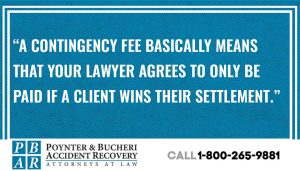
Contingency Fee Definition | Poynter & Bucheri

If you were recently in a car accident or suffered a personal injury, it’s important to hire an attorney. An attorney’s legal services can help you as the client through the insurance claims process, and they can help you maximize your compensation for medical bills and other types of damages.
While important, hiring an attorney can feel overwhelming, and many who need legal representation struggle to get started. Those who have never worked with an attorney before are frequently especially unfamiliar with their legal costs.
For one, you may notice that many attorneys advertise that they work on a contingency fee basis. This is especially common with personal injury and car accident attorneys.
Fortunately, we’re here to help each client understand the definition of contingency fees and what they can expect from a contingency fee agreement.
Further, if you’re interested in hiring an Indianapolis personal injury lawyer who works on a contingency fee basis, contact the experienced attorneys at Poynter & Bucheri. We can help you recover compensation for various types of personal injury cases, including car accidents, dog bites, slip and fall accidents, and more.
Contingency Fee Definition

A contingency fee basically means that your lawyer agrees to only be paid if a client wins their settlement. Rather than expecting upfront fees or hourly fees, an attorney who’s paid based on a contingency fee takes a percentage of your compensation from an insurance company or defendant. The lawyer’s pay is contingent on you as the client winning your case or when your case settles.
This is a great option for many because you may not have the money to pay for legal fees upfront, especially if you’re struggling to work due to a personal injury.
With contingent fees, you don’t need to risk the possibility of losing a great deal of money in your case. You’ll likely need to pay court fees, litigation costs, and out-of-pocket costs, but you don’t need to pay an hourly fee to your attorney. If you lose your case, you will not owe your lawyer money for their legal services. They only get paid an agreed-upon percentage of your settlement.
What Types of Lawyers Use Contingency Fees?
Not all lawyers work based on contingency fees, but most personal injury attorneys will offer a contingency fee arrangement. Additionally, most lawyers handling Social Security disability claims also use contingency fees.
On the other hand, attorneys handling criminal law cases and divorce proceedings do not work based on contingent fees. The Indiana Rules of Professional Conduct prevent these types of lawyers from working for a contingent fee. Instead, they’re compensated based on a flat rate or an hourly basis.
When a Lawyer Receives a Flat Rate
Criminal defense lawyers usually charge their clients flat fees. The client will enlist the lawyer’s services for the duration of their specific case. Their professional relationship will then conclude after the case is over. The client will pay the attorney the same fee regardless of the case’s outcome.
Sometimes, lawyers specializing in family law will also charge a flat fee, but this is far less common than an attorney using an hourly rate and a retainer fee.
Lawyer Retainer Fees and Hourly Rates
Lawyers handling family law civil cases will typically charge an hourly fee to their clients in addition to a retainer fee. Those hiring this kind of attorney will compensate them for the total time they spend on the case. The law firm may also require you to sign a retainer agreement.
With a retainer agreement, you agree to pay your attorney before they complete their legal services. The amount the lawyer will be paid will depend on the specific agreement.
The law firm will keep the retainer payment in a trust account, and the lawyer will receive the money when the case is complete.
Benefits of Contingency Fee Agreements
Unlike flat and hourly fees, you don’t need to make any upfront payments to an attorney who’s paid based on a contingent fee. This is especially important for those who may already be struggling with costly medical expenses. The attorney receives a percentage of your personal injury claim, but you don’t need to worry about an additional lawyer’s fee.
Another clear benefit of contingency agreements is that lawyers have an inherent incentive to maximize your compensation. Your lawyer receives a percentage of your claim settlement or litigation winnings, so they’ll be more inclined to help ensure you receive the most money possible.
How Are Contingency Fees Calculated?
Your lawyer and their firm will consider various components when formulating your contingency fee agreement. This contract should explicitly state the percentage you will pay your attorney.
The following are considerations the lawyer will take into account:
Case Complexity and Expected Duration
Unsurprisingly, more complicated cases usually mean more legal work for the lawyer, and they will set their contingency fee agreement accordingly. For instance, a car accident with clear liability will likely require less work than a complicated product liability case.
The lawyer may also charge a higher percentage if it appears the case will take a long time to settle.
Insurance Claims and Lawsuits
Lawyers typically charge smaller contingency fees for insurance claims compared to lawsuits. If your lawyer and the insurance company can’t reach a favorable settlement, you will need to sue the insurance company or their client to recover compensatory payment.
From there, your lawyer may require you to sign a new contract with a higher contingent fee. This is common because litigation is more complicated and challenging than an insurance claim.
Additionally, some lawyers use what’s known as a “sliding scale” to determine contingency fees. For instance, they may charge 30% for an insurance settlement if it settles without a lawsuit. If they file a lawsuit, that percentage will go up to 35% if they can still settle with the insurance company. If a jury needs to determine the outcome, that percentage could go up again to 40%. Fortunately, most claims are settled out of court.
Time to Prepare the Case
If you require an attorney’s legal expertise on short notice, the cost to access their services will likely be higher. The reason is that the lawyer will have far less time to prepare your claim. Their contingency fee will be higher because they’ll need to quickly gather evidence and prepare to argue your claim.
Indiana Contingency Fee Arrangement Laws

Indiana does not limit the percentage a lawyer may receive from a contingency fee arrangement. The only limitation is for medical malpractice cases. An attorney is not allowed to take more than 32% of a malpractice victim’s personal injury claim as a contingency fee.
While Indiana’s state laws do not limit most attorneys’ contingency fees, The American Bar Association’s Model Rules of Professional Conduct does include rules for contingency fee agreements.
Section 1.5(c) states that the agreement must make it explicitly clear to the client what percentage the lawyer will take. The contract must also be clear about what expenses the client is liable for regardless of whether or not they win the case. Finally, both parties, the lawyer and their client, must agree to the terms of the contingency fee agreement.
What Costs Are Not Included in Contingency Fee Agreements?
Although paying a lawyer based on contingency doesn’t come with much risk, you’ll still be responsible for certain expenses.
For one, you’ll need to pay court filing costs. You’ll also be responsible for paying other logistical expenses related to your lawsuit or claim, such as mailing and travel expenses.
The complexity of your case may also lead to additional costs. For instance, if you file a personal injury case and the other party’s insurance company denies responsibility, your lawyer may need to enlist the help of investigators or expert witnesses. These third parties will help build your case, but they’re typically not included in a lawyer’s contingency fee.
Can a Settlement Include Payment for a Contingency Fee?
It is possible for a personal injury case settlement to include compensation for attorney fees.
Indiana Code § 34-52-1-1 states that:
“(a) In all civil actions, the party recovering judgment shall recover costs, except in those cases in which a different provision is made by law.
(b) In any civil action, the court may award attorney’s fees as part of the cost to the prevailing party, if the court finds that either party:
(1) brought the action or defense on a claim or defense that is frivolous, unreasonable, or groundless;
(2) continued to litigate the action or defense after the party’s claim or defense clearly became frivolous, unreasonable, or groundless; or
(3) litigated the action in bad faith.”
Contact an Indianapolis Lawyer
Working with an attorney who’s paid from contingency fees is a great option for many. If you need an Indianapolis personal injury lawyer who works based on contingency, contact Poynter & Bucheri Accident Recovery Attorneys at Law.
We have years of experience representing injured clients and fighting on their behalf, and we’ll work tirelessly to maximize your compensation. As our client, your exact damages will depend on the circumstances surrounding your case, but we may be able to recover recompense for property damage, past and future medical bills, lost wages, loss of future earnings, pain and suffering, and more.
Schedule your FREE case review today online or by calling 1-800-265-9881.
